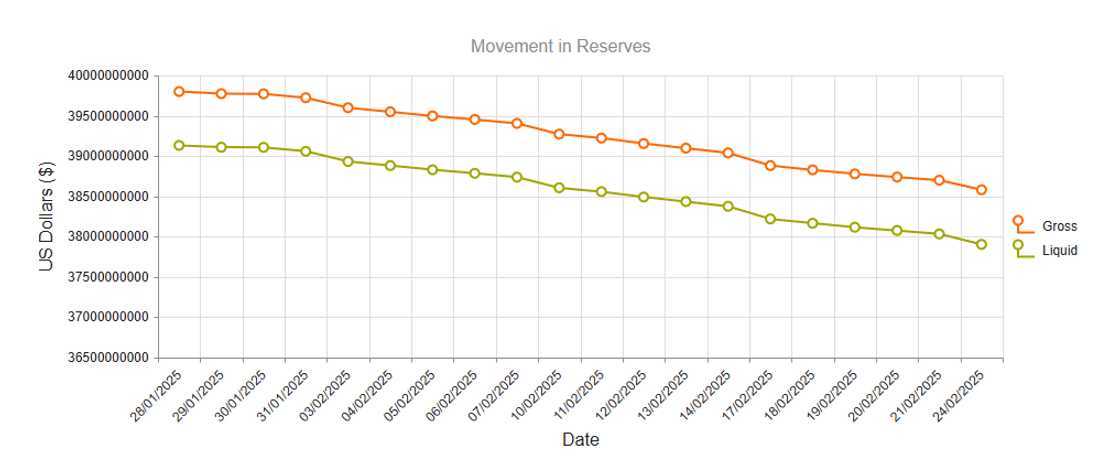Naira in Trouble As Foreign Reserves Drop for 33 Straight Days
- Nigeria’s foreign exchange reserves have declined in the last 33 days straight by almost $2 billion
- The reserves decline came as the Central Bank of Nigeria (CBN) amid efforts by the CBN to stabilise the naira
- The naira in recent weeks has improved in value against the dollar and other major currencies in the official and black market
Legit.ng journalist Dave Ibemere has over a decade of business journalism experience with in-depth knowledge of the Nigerian economy, stocks, and general market trends.
There is speculation that the naira could be vulnerable going forward as Nigeria’s foreign reserves have fallen for 33 straight days.
Analysis of Central Bank of Nigeria data shows that the country's dollar reserves are down $2.2 billion since hitting a $40.92 billion high on January 6, 2025.

Source: Facebook
Bloomberg reports that the depletion of the reserves is the longest since November 2022 and takes reserves to the lowest level since October 2024.
The decline in reserves follows comments from Bismark Rewane, who stated that the CBN is actively defending the naira, having spent over $8 billion to strengthen its value against major currencies, including the dollar, euro, and pound sterling.
Rewane described the intervention as important to correcting the currency’s undervaluation which he believes is around 30%.
The renowned economist highlighted data showing that the gap between the parallel and official exchange rates has narrowed significantly to less than 1%, a sharp improvement from previous discrepancies of 10–20%.
He also stated that Nigeria’s trade balance has risen to $18.6 billion, its highest in years, AriseTV reports.
His words:
"Margaret Thatcher spent $27 billion defending the British pound in the 1990s. China used $1.2 trillion between 2015 and 2016. Russia deployed $80.5 billion between 2014 and 2015. Switzerland committed $480 billion.
"So, if I say the Nigerian government is using $8 billion, which is a mere fraction to support its currency, an undervalued one at that, not an overvalued currency, then quite frankly, that’s a positive move. We should support such an initiative. If they were propping up an overvalued currency, that would be a different matter.
"When you say the Central Bank of Nigeria (CBN), or by extension the Federal Government, is intervening to safeguard, stabilise, and protect the value of the naira that is precisely their role."

Source: Facebook
Importance of foreign reserves
Foreign reserves growth is important because it acts as a safety net for a country's economy, allowing it to stand against currency fluctuations, sudden capital outflows, or economic crises by providing readily available funds to intervene in the foreign exchange market and stabilise the domestic currency.
Some of the reasons FX reserves growth is important include:
The CBN use it to manage exchange rate stability.
It is also used to pay external debt.
Naira exchange rate improves
Ealier, Legit.ng reported that the naira's value has improved against the dollar in both the official and also black markets.
Data from the CBN's NFEM portal shows that the naira opened trading strong at N1,495.91 against the dollar.
Currency dealers quoted the dollar at a high of N1,505 and a low of N1,495 per dollar before closing at N1,501.50.
PAY ATTENTION: Сheck out news that is picked exactly for YOU ➡️ find the “Recommended for you” block on the home page and enjoy!
Source: Legit.ng





